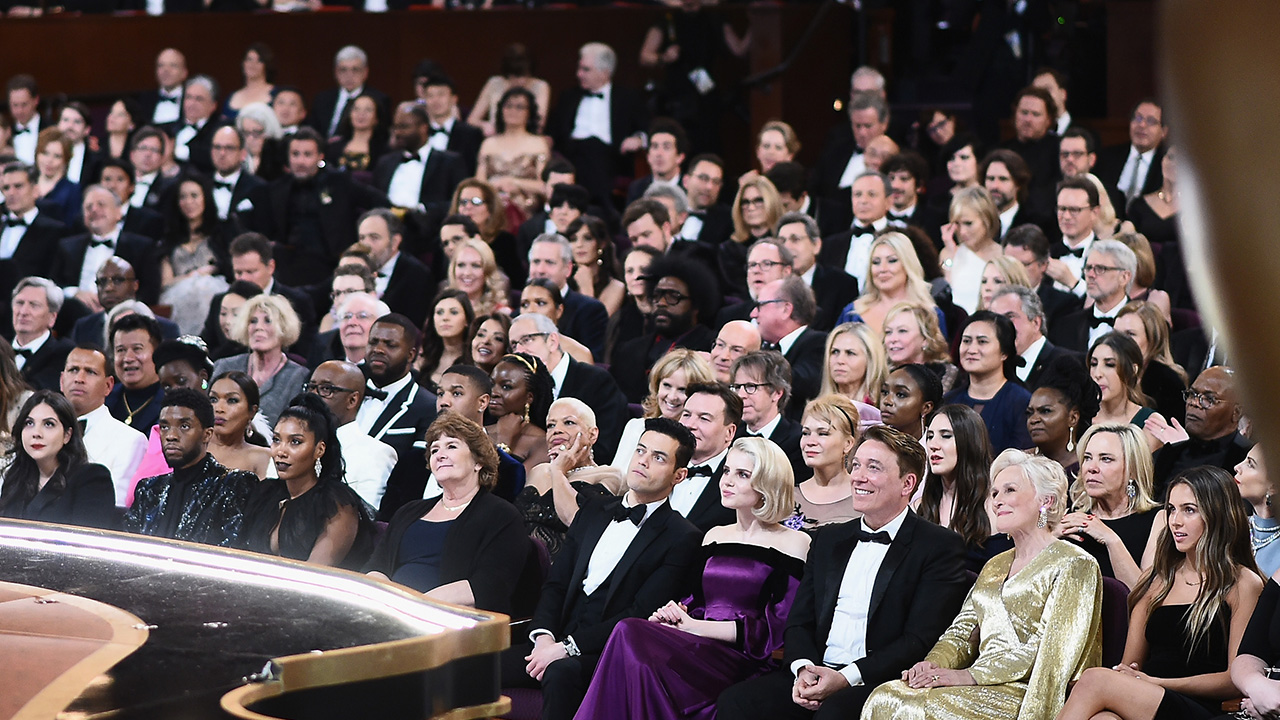Royal Pains Set Visit Part 3: Jill Flint And Jace Alexander Interviews
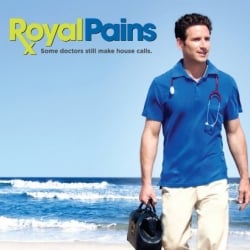
Your Daily Blend of Entertainment News
You are now subscribed
Your newsletter sign-up was successful
Did you catch the premiere of Royal Pains on USA last night? If so, you're already familiar with Dr. Hank Lawson and his brother Evan, and the beginning of their misadventures among the overly rich, overly powerful residents of the Hamptons.
Royal Pains will be airing through the summer on Thursdays at 10 p.m., following Hank's (Mark Feuerstein) concierge doctor business, his tentative flirtation with local doctor Jill Casey (Jill Flint), and Evan's (Paulo Costanzo) constant attempts to climb the social ladder. I've already brought you parts one and two of my set visit, but I've got one more set of interviews to bring you, with Jill Flint and series co-executive producer Jace Alexander. Check out the insight they have to offer on Royal Pains and where it will go from here.
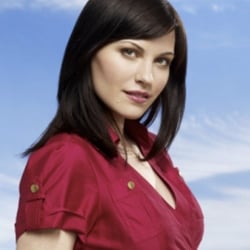
Jill Flint
Do you want to just start off telling us about your character?
Sure, sure. Jill Casey is a local, she grew up in the Hamptons. She’s a hospital administrator for Hamptons Heritage Hospital and as a person, she’s a very driven woman. She’s not impressed with the whole hullabaloo of the rich and the famous that live up there, with their big houses and their fancy cars and their attitudes. She’s not impressed by any of that.
She’s more interested in taking care of the people that she grew up with, people that she had been surrounded with her entire life. The locals, the people that, you know, do work in the restaurants or, you know, the local electrician. Just the average blue collar folk. They sort of get pushed aside by these jerks who drive in there, you know, thinking they’re all that.
Her passion, her dream, what she wants to do is open a free clinic and that attracted me to the script, because I think it’s very relevant to what’s going on in this day and age. I mean, how many Americans can really afford to go to the doctor, have healthcare and have it be decent? And if you’ve ever been to any sort of free clinic or sliding scale clinic here in New York, they’re kind of scary.
Your Daily Blend of Entertainment News
How does your character's story parallel Hank's in the show?
When Jill meets Hank, I think that there’s an instant recognition, because he also is not impressed by how much money you have, if you’re in charge or not, because he’s the kind of guy that will shoot from the hip. There’s a spark between the two of us, that, you know, “Ah, we’re on the same page, great, I’ve got an ally."
Can you tell us where the character will go from here? She has a big secret, right?
Yeah, she does, she does and I don’t know what that is yet. Oh, really?
I’ve been teasing my friends. [They] have all checked out the website as to what is your big secret? What’s going on?
It’s fun and we’re having a blast with it. Hank and I are just starting to spend more time together and find ourselves in different situations. We get to butt heads with each other and there’s a sort of sexual tension between the two of us and two different ways of looking at things. But as far as, you know, where she goes, we’re still working on it. I don’t want to tell you too much.
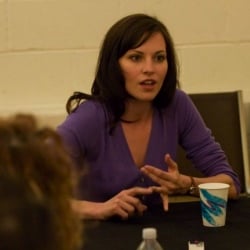
Mark mentioned that you guys do a Bonnie and Clyde kind of thing in one episode. Can you talk about that?
I don’t know, how much did he tell you? [There's a doctor who has] hepatitis and, you know, he comes to the hospital and he’s asking me—he’s asked me for a lot of things. Oh, gosh, all these episodes are a blur right now.
I have my certain way that I have to do things, I run this hospital, I’m responsible for everything that happens in it. And, then, you know, you’ve got [Hank's] way of doing things. He is asking me for specific favors that I may or may not be able to provide for him.
There’s always a story that goes along in with it-- as I get to know him more, I realize that he’s not just a concierge doctor, not just catering to the rich. I start to realize that he’s got a heart behind it and it’s not about money for him. He just loves taking care of people and that opens me up more to take risks in what I do to aid him and help him. Because I’m starting to stand behind him, the more I see of him, the more I believe in him, the more I believe in what he does. And, that starts to fuel the relationship between the two of us.
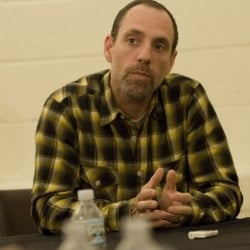
Jace Alexander
Can you talk a little bit about how the show came to be?
I can talk a little bit about how it came to be for me, as I was not, at the time, in the brain of the creator, Andrew Lenchewski. I read the script and I responded right away to it, because I loved the characters and I’m hoping that--that is really the key to our show--is that audiences fall in love with these people the way that I did when I first met them. Even on the page, they were people who seemed incredibly honest and incredibly open and fun to be with and had a great sense of humor and irony about themselves and life and the world.
The fact that I live in New York and it takes place in the Hamptons, had a little bit to do with it as well. I love shooting here. I love the idea and the challenge of figuring out a way to shoot a show that takes place in the Hamptons, without actually having to be there all the time. Because just financially, there’s no way anyone would be able to pull it off, with the type of schedule that we have, cranking out a new episode every seven days.
You shot the pilot episode. What was the hardest thing about that?
The hardest part, for me, is that the expectations of what a show needs to be in a pilot, will always continue to be very high. Whereas the economy dictates that the money to pay for those expectations continues to drop. Basically, what we’re dealing with now, in this day and age, is the fact that we just have less time and less money than people used to, to do the exact same thing. So, the challenge for all of us, and for me as a director and a producer, is figuring out how the heck we pull it off.
The fact that we were shooting in the Hamptons had something to do with it specifically, since we really couldn’t spend every day in the Hamptons. We ended up shooting out there for just five days of the nineteen. And, then the rest of the time, finding places that we could really make feel like the Hamptons.
I’ve got to say that in terms of the cast, they made it a lot easier than it would have been with a lot of other people. I love working with actors who have the type of dedication and enthusiasm for the work that our four leads do. And, then including our recurring guys, Campbell Scott and Christine Ebersole and Ezra Miller and Meredith Hagner, who are also recurring for us. We didn’t have any “celebritie." I’ve worked with a lot of terrific name actors, but, you know, sometimes there’s a lot that comes with that. And, we don’t have to worry about that. You know, we have professional actors who are just really good at what they do and bring a lot of joy to what they do.
Do you think that the Hamptons has the same fascination for people who don’t live in New York and don’t know anything about the Hamptons?
If we bring it into people’s consciousness, then I think it’ll start to create a buzz and people will be aware. I mean, I look at the Hamptons as an extension of New York City and I think they’re kind of inextricably bound. New York being as famous a metropolis as it is, you know, by extension, the Hamptons have that going for it. I think the Hamptons people wish that that secret wouldn’t get out so much in some ways. But, I think that if we’re good at what we do, as this show continues to build, you’ll see a lot more talk about the Hamptons and about what it means to be a Hamptonite and about how cool it is.
When you're working on such a tight schedule, how do you work with the cast and allow room for improv?
How do we do that? Because we don’t, we don’t have enough time. When we’re pulling out our hair with [little details] every single day, I always remember that moment in Shakespeare in Love, when the producer turns to Geoffrey Rush and goes, “How will we ever pull this off?” And, Geoffrey Rush just says, “I don’t know, we just always do.”
And, he’s right, somehow, it’s this combined force of all of these people who know what they’re doing and do their jobs really well, that we’re able to make it work. In terms of what you’re saying, in terms of about being able to give them a forum to find that comedy, you know, we have to work really hard.
And, sometimes it doesn’t happen. Sometimes it’s, like, “No, we got to move here, got to move here, say those things, do those things and let’s move on to the next bit.” But remembering where the important moments are so that we can carve out that time, to allow for that to happen. That’s really key.
Staff Writer at CinemaBlend

